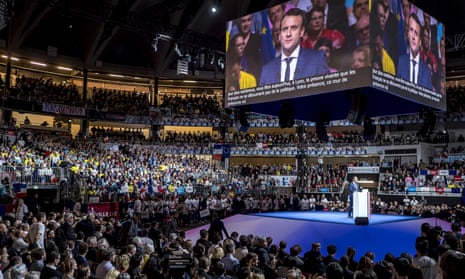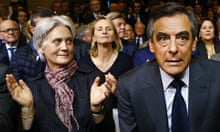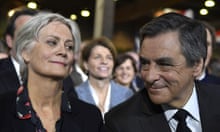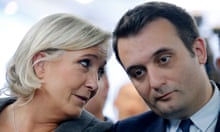Most British politicians are blissfully ignorant about French politics. Fixated by events in Washington, they rarely think about those just across the Channel. Every Whitehall spad will know the name of the mayor of New York; perhaps only one in a hundred could identify the mayor of Paris.
It would be naive to think this longstanding complacency was about to change, least of all in the solipsistic politics of a Brexit Britain in which fewer people than ever learn modern languages. Nevertheless, strange but true, as Britain turns its back on the EU, there seems to be a glimmer of awareness that politics in the republic in 2017 are not only at an interesting stage but might even have some direct bearing on the tortuous process to which MPs regrettably gave their assent when they voted for the triggering of article 50 this week.
In three months’ time, France will have a new president in place of François Hollande. The prospect that this president might be Marine Le Pen of Front National explains most of the uptick of awareness about France. Yet if three opinion polls published this week are correct, it will not be Le Pen. Instead, it will be ex-banker and former finance minister Emmanuel Macron, an economic and social liberal who speaks impeccable English, knows this country well and is running as an independent centrist. The polls show him defeating Le Pen in a head to head by 63% to 37%.
Much can change before the first round of voting on 23 April, and opinion polls are often wrong. Britain’s 2015 general election, the Brexit referendum, the second Spanish general election of 2016, the US presidential election and the Italian constitutional referendum all produced results to the right of what polls had signalled. The same thing may happen in France.
Nevertheless, the election of a liberal centrist, committed to a less austerity-driven eurozone and refusing to reimpose internal borders with EU partners, would be an event of continent-wide significance. Macron’s desire to reform the EU to make it work better may seem “Anglo-Saxon” in some ways. For a Britain embarked on Brexit, however, it could be a very uncomfortable development, increasing the chances of a hard future relationship with Europe.
France’s two-stage presidential election process favours Macron’s En Marche! (note the initials) movement. In the first round, voters choose from a full spectrum of candidates; the second round is a runoff between the candidates who finished first and second. As the historian Robert Tombs puts it, in the first round you vote “for the person you want” but in the second you vote “against the person you fear”.
This favours whoever gets into the runoff against Le Pen. True, many things have changed since Jacques Chirac gained 82% of the vote in a runoff against Le Pen’s father, Jean-Marie, in 2002: economic stagnation, increased migration and Islamist terrorist attacks among them. Marine Le Pen has also dropped some of her father’s far-right stances: her programme no longer calls for the reintroduction of the death penalty, for instance. Her polling levels reflect these changes. Jean-Marie Le Pen only squeaked into the second round in 2002 with 17% of the vote, profiting from divisions among his rivals. By contrast Marine Le Pen is currently set to top the first round with around 25%.
Macron owes his current strong showing to his own audacity and to the stumbles of others. The fact that he is only 39, has never been elected to any political office and has no party machine behind him all speak to his daring. But he would not be on the threshold of the presidency without the assistance of his rivals. François Fillon’s candidacy on the right hangs by a thread because of his wife’s earnings from a political job she seems never to have done. Meanwhile the socialist party has chosen leftwinger Benoît Hamon. Both have been slipping in the polls. Together, these choices have opened up the centre for Macron.
French presidential elections often ebb and flow. Macron is now the candidate the others have to break if they are to grab second place behind Le Pen. His rivals will paint him as a creature of the elite. In the face of rumours, this week he denied a gay, extramarital affair. Julian Assange and his Russian providers claim to have something up their sleeves.
A Macron victory would be a rebuff to those who believe Brexit and Trump will have a domino effect. It would confound those who want the EU to unravel (though that may happen anyway). It would be a rejection of the Front National and of the established parties of France’s fifth republic. For the Gaullist right, it would be a rejection of the republican grandeur bequeathed by De Gaulle. For the left, it would be a rejection of state dirigisme in the labour market.
Whether there would be a durable national embrace of what Macron stands for is far from certain. In large part that is because Macron has not said what he stands for. It is one thing to campaign by brilliant marketing, and quite another to govern by it. And a man who becomes president with the first-round support of barely a quarter of the electorate will always have relatively little room for manoeuvre. The ability of France’s public sector unions to prevent reform remains formidable.
For British Europhiles, a Macron election would be bittersweet. Here is a reform-minded French politician with a view of the EU and of European security that Britain could support and work with if only Brexit were not happening. Instead here are we, backs turned to Europe, minds turned inward, our politics and country fragmenting, naive supplicants at the court of the worst US president in modern times.









